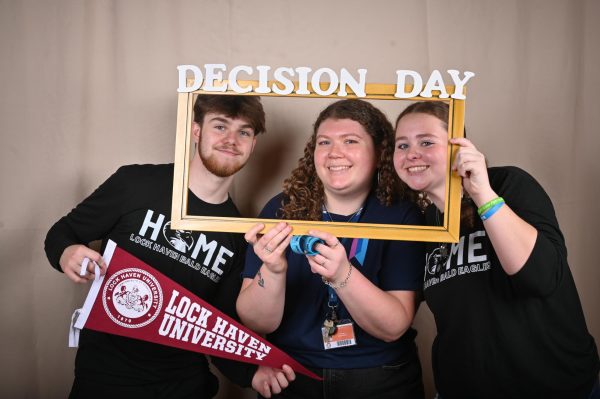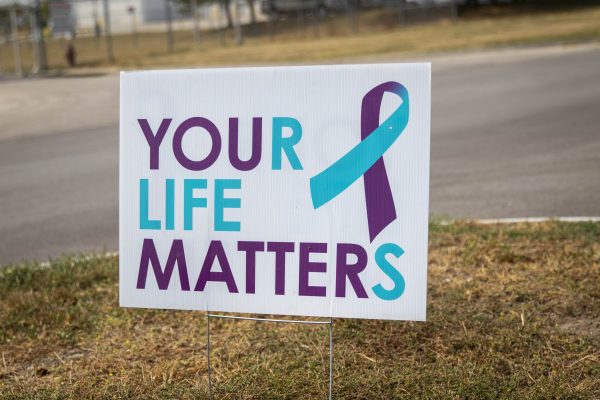Can you be Good Without God? You don’t have to be religious to be moral
Sophomore Kendall Gardner
THUD!
A mail man carrying boxes slips on the icy sidewalk across the street, tumbling to the ground. Without a moments notice, you are by his side. After disregarding traffic and your own safety on the ice, you help the man with the last of his packages. With a parting smile, you go your separate ways.
This undeniable instinct is compassion caused by morality.
In my sixteen years of life, most of the people I’ve known have associated this quality with religion. They say people who are religious are holy, more charitable and that they have “better” morals.
Somewhere along the line I lost my faith, but that is not what I’m here to write about. I’m here to write about the looks I get when I tell people that I am an agnostic atheist.
I tell them “I do not believe in any one God or religion, but I cannot lay claim to whether a God exists or not.” Before the last syllable is out of my mouth, people generally have a confused/horrified look on their face. When I ask them why, I get the same answer, usually in a scatterbrained manner as they try not to insult me: Atheists are immoral because without religion, there’s no basis for morality.
I disagree with that statement because acts of morality are acts of instinct. Before humans knew anything about disease, weather, and other things, they needed a reason where there was none. Myths were made. But science has proved many of these myths wrong. In the same type of situation, the Catholic church had a list of books that were banned. As secular movements came and went, the church dismissed their list of books but not because God told them to, but because social standards had changed.
Humans, being the most evolved species on this planet (although that can be argued), have come to their understanding of morality through evolutionary processes. Whether that be Lamarkism (development of new characteristics become inheritable) or Darwinism (small changes are acted upon by natural selection). Either way, what is socially acceptable as right and wrong are passed along, leaving the offspring more intricately developed.
A study by Vern Bengston, a USC professor of gerontology and sociology, has shown that children who grow up without religion commit less crime than those who have a religious upbringing. Though acts of morality often do come from religious people, morality itself could not come from any one God.
Ask yourself this: Do actions become moral simply because they’re dictated by God, or are they dictated by God because they are moral? The latter sounds better because it is. If the former is true, then acts of a God, at least that of Christianity and Judaism, like slavery (Leviticus 25:44-46), genocide (Deuteronomy 7:1-2, 20:16-18), the killing of those who are homosexual (Leviticus 20:13), and the stoning of non-virgin brides (Deuteronomy 22:20-21) are all moral actions under the grace of said God.
Although those who follow a religion are generally good people, people who do not follow a religion are often seen as, for lack of a better word, evil. But many of the most charitable people in the world are devout atheists. Warren Buffett, Bill Gates, and George Soros top the list with a lot of time and money donated.
So please, next time you meet someone whose religious beliefs do not match yours, don’t jump to conclusions.

Hi, my name is Haley Wagner. I am a sophomore this year. I'm a member of the Dance Fusion Competition Team and this year I am in 7 competition dances,...














Ben DelBaggio • May 5, 2017 at 2:43 pm
This is a great topic and I hope more editorials about this are published!
Kari Diaz • Nov 10, 2016 at 12:08 pm
As an educated woman as I am I have to agree with you. Everyone is free to believe as they want. I consider myself a Deism. Just like Leonardo Da vinci and Abraham Lincoln. Is there really a god? can someone really prove that theory with Strong evidence , no because its philosophical, mythological. Its what we are brought up to believe. No one truly knows if there is or not a god. Universe there is.
torrin ray • Sep 14, 2015 at 1:21 pm
god is real make no mistake about that this shouldnt even be aloud to be on here if we beleive in god and cant speak our mind about why should you
Steve Everhart • May 21, 2015 at 10:08 am
Brilliant article–with brilliant counter-point commentary from readers. It’s refreshing to see so many minds alive on this topic at Tyrone High. Keep asking questions like this. As soon as we believe we have all the answers, we stop learning. Always be humble enough to admit ignorance. If there is a God–and my limited understanding of probability, neuroscience, and mass murderers suggests that there is–then that God is far beyond our capability to comprehend. Whether you are atheist or believer, always leave enough room in your mind to doubt your doubts…and to ask if something as amazingly complex as your mind could ever happen by accident.
Valerie Smith • May 20, 2015 at 4:18 am
As someone who used to write for this newspaper I have to commend you on your articulate, well written article. However I must disagree with your opinion.
My first disagreement arises with your view on man-kind. Humans were created by God, therefore any good quality they have comes from Him. The Bible furthermore states that humans are evil and self-centered, thus as someone who is a “good atheist” you are even more indebted to God than if you were not a good person. Any act you do, even the very talent it took you to write this article comes from the God that you do not believe.
My secondary disagreement comes from some of the Atheists or agnostics you sighted. While your article was well researched, you would do well to research more on some of these people. For example Darwinism has some very racist roots to it.
In closing at sixteen you are a very intelligent young lady, but you should not stop exploring at this stage, as you explored in the past to come to atheism, I would encourage you to explore Christianity some more.
Rae Bonsell • Jan 13, 2016 at 6:49 pm
I will not argue with you on whether God is real or not, that is not what I have come to reply to.
I simply would like to point out that there is no proof– and you can argue that the Bible is all the proof you need– that God exists. So your opening argument to her opinion– which you argued with opinion– is not enough to invalidate her entire article.
If God exists, then your opinion is correct. Man-kind was created by God.
But if he does not, than you lack no validity in your statement and morality does not derive from God.
Sadie • May 19, 2015 at 9:37 pm
I do not disagree that someone can have morals without “having religion,” but as a Christian myself, I do want to address a few things about your piece.
First, is it to say that humans are moral without God or because Christianity was known as the normal and most people followed it’s practices without question? It was not until the enlightenment, romanticism, age of progress, war and displacement, and the contemporary (post modernism) eras that people were questioning what is real and anything apart from what they have known. So can one rightfully say that humans are moral without religion or God, or that they are moral because of the teachings of Christianity even if they have parted from those original roots?
Second, I would like to address the following quote:
“Ask yourself this: Do actions become moral simply because they are dictated by God, or are they dictated by God because they are moral? The latter sounds better because it is. If the former is true, then acts of a God. at least that of Christianity and Judaism , like slavery (Levi. 25:44-46), genocide (Deut. 7:1-2, 20:16-18), killing of those who are homosexual (Levi. 20:13),and the stoning of non-virgin brides (Deut. 22:20-21) are all moral actions under the grace of said God”
All of the verses that you cited are from the Old Testament. In the Old Testament the people were instructed to follow the Law of Moses. All of the above verses are what they are said to be in your reference. That is under the Law of Moses. You said that all of those were said to be a “..moral action under the grace of said God,” but they are rules to be followed under the Law of Moses. In case most of you who have read the Old Testament, have not realized that there needed to be something done to remedy the problems– hence where Jesus comes in and where the New Testament comes in as well (this is not to say that the Old testament is not important today).
God sent His only Son, Jesus, to be a living sacrifice for His peoples. Jesus came to restore the Earth. He was born of the virgin Mary and was on Earth as fully God and fully human (he was tempted and felt all of the things that we feel today), but He was one without sin He had haters and followers. He created miracles (and He still does today). But He was sent here for a purpose. To save us. He was crucified on a cross (the most brutal of deaths) and rose from the dead. Jesus became the ultimate sacrifice. The New Testament is where the Law of Moses has been forever fulfilled by the Living Sacrifice (Jesus).
This is where we find verses that advise against the mentioned actions– slavery, but there is also direction on how to handle slavery because it already existed (Galatians 3:28, & 5:1, Ephesians 6:8-9, 1 Corinthians 7:23), genocide (there is a stress on loving your enemies– Matthew 5:38-48), killing of those who are homosexual (the Bible acknowledges this to be against the will of God, but it does not separate it from any of the others sins in the Bible, it does not support the killing of those that are in sin. It stresses to love those in sin and plant seeds of the Living God), and lastly, the stoning of non-virgin brides (or adulteresses) (John 8:3-11).
So while you are advocating that humans can be moral without religion or a god, I am questioning if they are moral because of God– there is a basis, a foundation, in a religion.
Adam • May 19, 2015 at 10:51 pm
This is an interesting topic to consider and one that is often not spoken about. What’s terrifying is that a large majority of the country would find this article offensive, perhaps even an act to destroy our world as we know it.
I consider myself to be an atheist. After reviewing information presented by various religious groups I could not definitively accept one to follow. Yet say if I were to graduate college with a political science degree and then graduate from a prestigious law school.
I could play it perfectly. I could network with the right people, say the right things, maybe even come up with an effective plan as a platform for my campaign. Despite my best efforts however, I would almost assuredly never win an election. Now clearly there must be something wrong with that? Because I made a conscious decision based on the information infront of me I could never achieve a dream of mine because I am an outlier.
Because of my religious views as an athiest, I could never hold office. Human beings you must understandare afraid of anything they cannot comprehend. Its the same reason open homosexuals do not get elected to office either. We fear progress yet complain when nothing gets done.
You definitely do not need a religious upbringing to be a good person and if anything an overbearing theological “sheltering” of a child is one of the largest problems in our country today. An open mind in a so called free country is what we need, so why hinder that doctrine any longer?